We have harvested our own olives every year since we moved to Italy, although this year was rather different and that will be the subject of my next post.
I hope you will enjoy reading about the process, there are also links included to my posts from previous years, should you be interested.
Olive Harvest 2011 – Milling from Olive to Oil
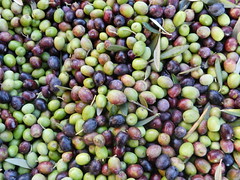
Once we had decided that five days picking was more than enough, certainly in one stretch, the next task was to get the olives to the mill. A good job we did stop when we did as we only just got them all in the X-Trail and the Smart Car would really have not been much help would it! If you have not yet read my post on our picking and would like to do so just click on this link. Olive Harvest 2011 – Picking
Loaded and ready to go!
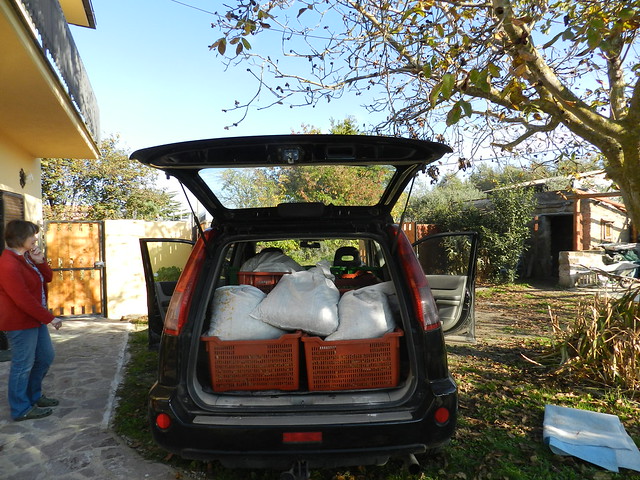
Off we then went on a short drive to the Oleificio in Montefiascone, where they were expecting us. We had arranged to arrive with our crop sometime on the Tuesday morning when we we would be given a more precise appointment for our milling.
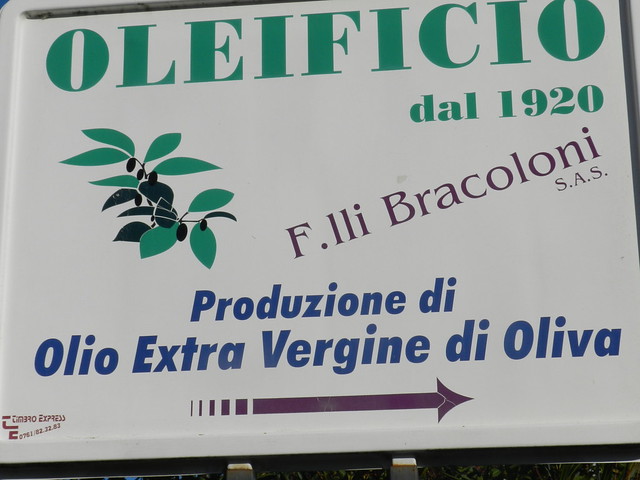
Arriving at the mill olives are unloaded into a large crate.

Our crate is the one in the top left hand picture and when we left on Tuesday it had been moved into the warehouse area for storage, photo top right. Before leaving we confirmed in the office that our slot for milling would be the next day, Wednesday 16th November verso (towards)2pm.
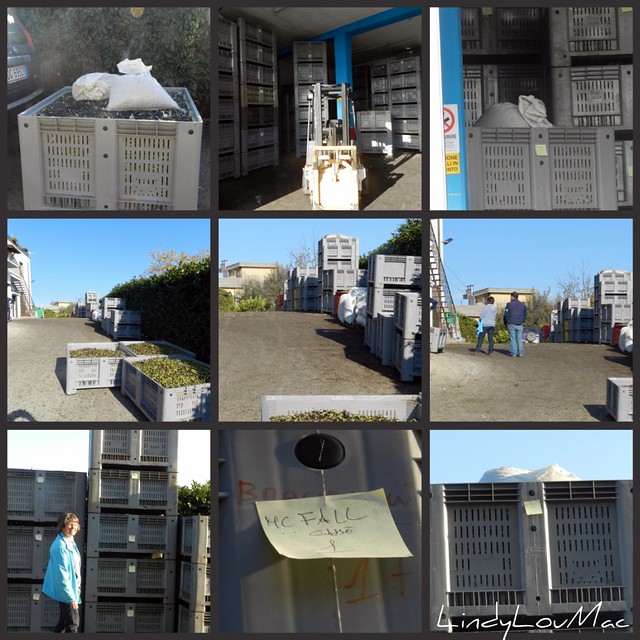
Having been through this process before we warned my sister that we were probably in for a very long afternoon at the mill. Fortunately she did not seem to mind, although she did take her book as I suggested she never actually got to read it, as she found the whole process interesting, well I she seemed to! We arrived at the appointed time and our arrival was acknowledged immediately, however it was probably half an hour later when someone decided to tell us that due to a breakdown during the night, they were running a couple of hours behind, so why not go off somewhere else for awhile. We took the advice and went off to the station to check the times for my sister’s train to Roma the next morning, we were unable to buy her ticket though as the Tabac (where they sell train tickets) was of course closed for the afternoon as were most of the local shops. There is a new branch of Todis in Montefiascone opened on 26th October which is unusually ‘orario continuato’ continuous opening with no afternoon closure, so we did a little food shopping before returning to the mill for our rescheduled appointment.
On our return we located our crate, now outside, see the bottom row in the mosaic above, just before 4pm our turn arrived. The crate was weighed we were given our ticket, for use later to pay for the milling process which is calculated by the amount of oil produced, then the olives were loaded into the hopper and the process began. The olives would appear as olive oil in approx two hours time, I followed the process as best I could in these photos. The first mosaic of photos show the olives being weighed, before being tipped into the hopper, the leaves are then separated from the olives by being blown and deposited in the basket outside, see bottom left of picture, before the olives are sent off into the milling machinery.

As mentioned above the leaves have been separated as the olives make their way into this first stage of the milling process where they are washed and ground.

In the next stage of the process the pulp is transferred into tanks, there are six in all and they are used in rotation, our olive pulp was designated to tank number two.
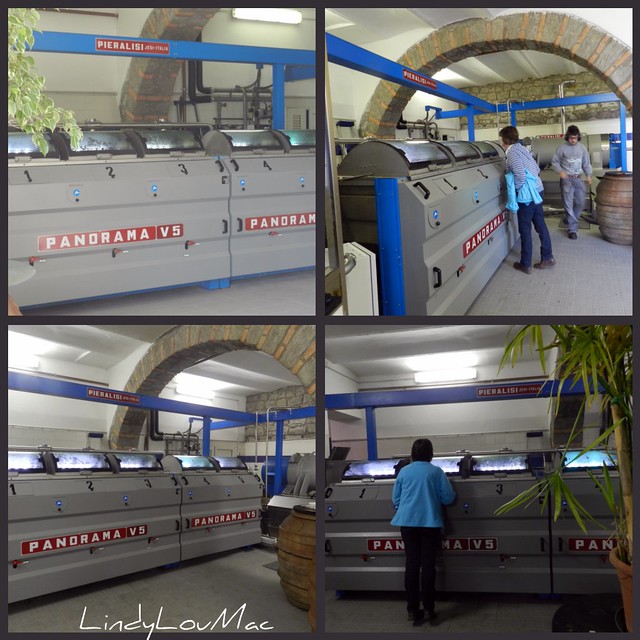
An impressive looking beast here are some close ups of the procedure, notice how red the pulp is going down the tube in the first photo, top left! The operative kindly opened the lid so that I could photograph the pulp entering the chamber.
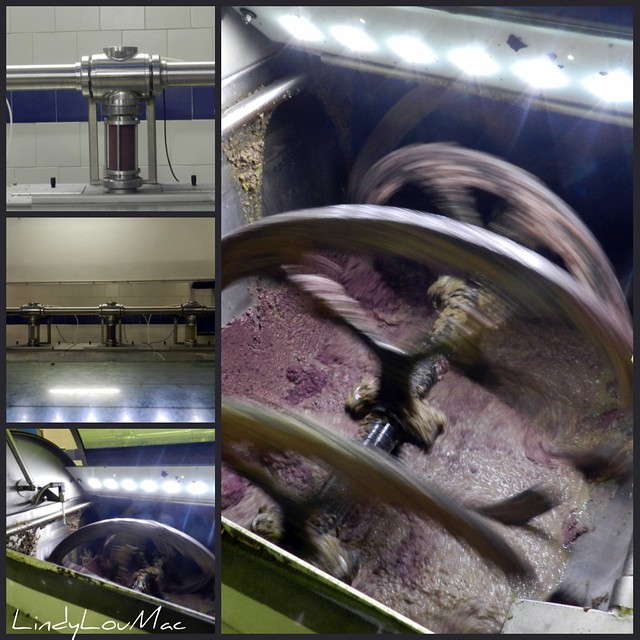
While we waited for the oil, I will took a few photos around the mill, including where the waste product from the procedure is transferred to. It appears to lose its colour looking at the last photo ‘ stuff’ which had been around for awhile maybe used as a compost product but this is just a guess.

The setting sun, Montefiascone Duomo and general environs of the mill.
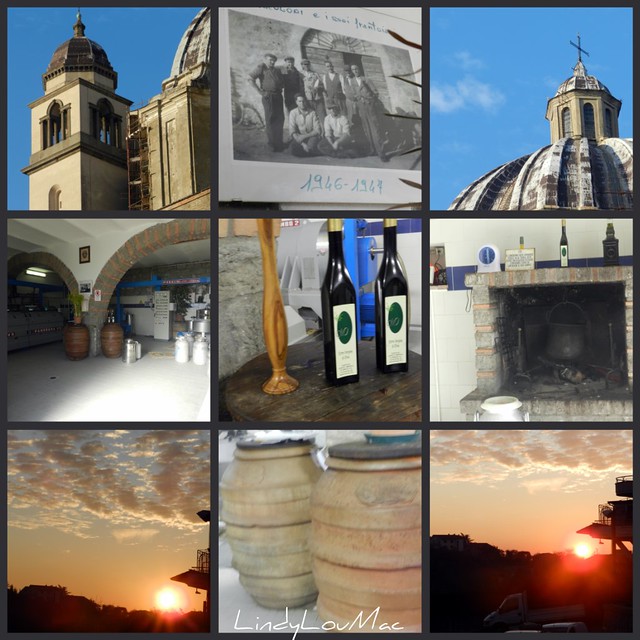
The green lights indicate that the pulp is ready for the next stage and the chamber is emptied as it passes through the next batch of machinery to the final stages, the waste product is removed and ends up where I showed you in a previous collage. It gets exciting as the procedure enters the final stages as you wait for your very own olive oil to appear.
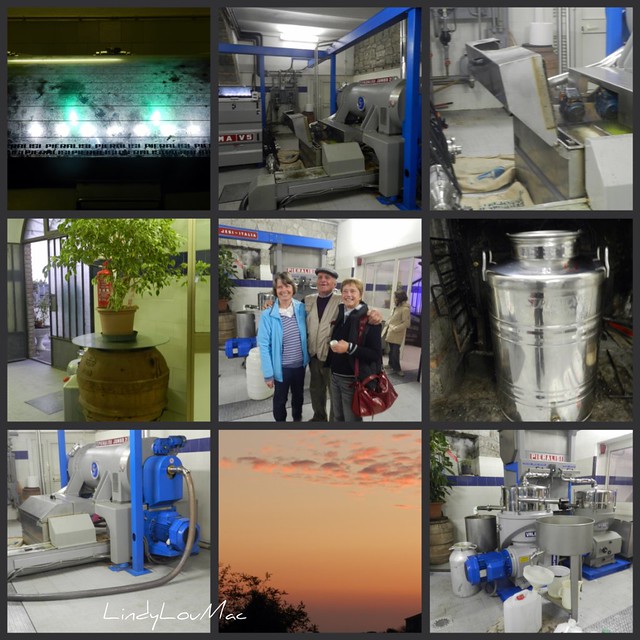
Which it finally does and to our delight the operatives told us that not only was our oil of a very good quality, but in fact even better it was excellent, they knew this because of the transparency, just take a look at the large photo!
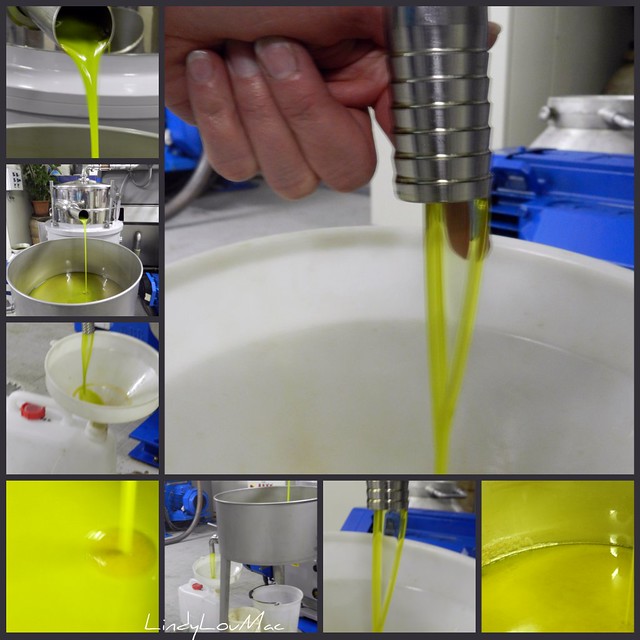
We are very pleased with the end result and I hope you have enjoyed my very basic description of the process, any mistakes are my own!
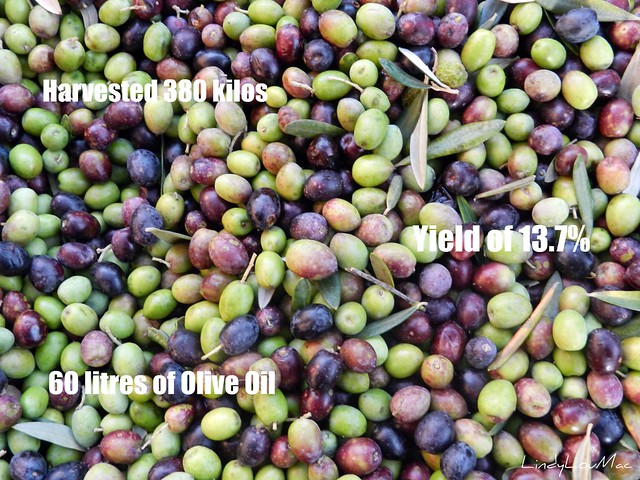
For those of you that are new to this blog and may be interested in the previous Olive Harvest posts, here are the links.
Olive Harvest - Phase One – 2009
Olive Harvest - Phase Two - 2009
Olive Harvest 2010 - Che Disastro!Travel Tales
Olive Oil 2010
and the prequel to this post Olive Harvest 2011 - Picking
Lots more photos can be viewed in in My Flickr Albums in the collection entitled Olives and Olive Oil.
Please note this post originally appeared as Olive Harvest 2011 - Milling from Olive to Oil on November 28th 2011.
News From Italy is currently in the running for an award from Expatblogs.com and as readers comments are considered in the final judging it would be greatly appreciated if you were able to consider leaving a comment.
With just a week to go before the final decisions are made your support would be very much appreciated.
Just click on this LINK to be taken to the comments page. Thankyou blogging friends and loyal readers.

Very interesting post. Do you happen to know what's involved to create the different grades of Olive Oil (e.g. Extra Virgin etc.)?
ReplyDeleteExtra-virgin olive oil comes from virgin oil production only, contains no more than 0.8% acidity, and is judged to have a superior taste. Extra Virgin olive oil accounts for less than 10% of oil in many producing countries; the percentage is far higher in the Mediterranean countries (Greece: 80%, Italy: 45%, Spain 30%). It is used on salads, added at the table to soups and stews and for dipping.
DeleteVirgin olive oil comes from virgin oil production only, has an acidity less than 1.5%, and is judged to have a good taste.
Pure olive oil. Oils labelled as Pure olive oil or Olive oil are usually a blend of refined and virgin production oil.
Olive oil is a blend of virgin and refined production oil, of no more than 2% acidity. It commonly lacks a strong flavour.
The following links will explain more if you are interested Daniel.
http://www.oliveoilsource.com/definition/extra-virgin-olive-oil
http://en.wikipedia.org/wiki/Olive_oil
I LOVE olive oil - and this post of yours!! I think I use olive oil just about every day..... mmmmm......
ReplyDeleteI use olive oil just in about everything even when it calls for vegetable oil.
ReplyDeleteMeu marido é italiano e toda sua família fazia esse trabalho lindo.E aquele óleo é divino!! Com uma bruschetta, hmmmmmmmmmmmmmmmmm....Coisa boa! beijos,chica
ReplyDeletewow, its must be wonderful to watch your own olives become bottles of lovely oil.What do they do with the mash from the hopper ( I missed that bit), do thy use it for fertilizer?Beautiful oil, and good to know yours is superior as well!
ReplyDeleteI think so Laurie. :)
DeleteGreat post Lindy lou Mac.
ReplyDeleteThe process is the same as here.. you forgot to mention Portugal!
Your car must have been really weighed down.!
Snr. Ze harvested quiete a good crop .. but not as good as last year.
I see your house in uk coming along.
happy week
val
I remember this interesting post and I have just enjoyed it all over again. Well done Diane
ReplyDeleteThanks for sharing how the process works - this was a fun post to read! Makes me wish we had olive trees here since we love olive oil.
ReplyDeleteInteresting post to read. I really enjoyed following the process
ReplyDeleteFascinating and I really enjoyed reading about it.
ReplyDeleteThis might be a stupid question, but I honestly don't know - do the olives have pits and what happens to the pits? Also, are the olives both green and black? How do you know when olives are ripe?
I'm sending this to my daughter. She attended an arts school, and one of the school's fundraisers was an olive il tasting. It is probably one of the most unique, fun, and educational fundraises ever! I absolutely love this post. Thanks so much for taking the time to write it and include such lovely photos.
ReplyDelete:D
It's a nice post. I like olive oil. I use it for cooking pasta and fry fish.
ReplyDeleteYour posts are so detailed. I love how you plonk us into your world for a little while.
ReplyDeleteAnn
I saw cute little olive trees at my country garden center yesterday and thought of you. :-) xo
ReplyDeleteWow this was interesting I have learnt so much about olives and olive oil......
ReplyDeleteThanks for your great post on the olive-to-oil process.
ReplyDeletePicking olives, taking them to the frantoio is terrible and extremely hard work, but the reward is priceless!
Very interesting!
ReplyDelete«Louis» thanks you for your recent visit to San Francisco Bay Daily Photo.
Good Morning Lindy,
ReplyDeletewow.. such interesting post . For sure,it is important to know how is the process of olive oil;;) for others who live far from Mediterranean.
have nice day
Very interesting, a lot of work with delicious results:)
ReplyDeleteFascinating post. I learned a lot about what goes into the end result. I enjoy good olive oil although imported olive oil is very expensive where I live. It's worth it though when I can afford it.
ReplyDeleteVery interesting and informative post. I can imagine it must be incredibly satisfying knowing the oil came from your own olives.
ReplyDeleteVery educational post and I love all the pictures that you took through each process. It really gave a good feel for the steps involved! And neat to know that the transparency is a good predictor of quality!
ReplyDeleteI'm so impressed by your description of the process and the fact that you had the opportunity to do this at all. What a great thing to be able to experience this and share it with us. I hope you get a special enjoyment out of the olive oil!
ReplyDeleteLiz
The whole process is fascinating and so well-explained with your text and pictures. (I had to give our daughter an almost half-full jar of olive oil when we left Oregon and then buy a new one for our Florida home when we got here....told Bill we might have to take out a bank loan ;>).....it is expensive, but we can't live without it. And I see why it is costly -- much labor involved.
ReplyDeletethis was so much fun to see the process
ReplyDeletefrom beginning to end. i'm glad you
have an excellent oil to show for your
hard work!
Lindy I'll definitely think of you whenever I use olive oil. I usually buy extra virgin. I enjoyed reading about the production process. Own lucky you are to have your own.
ReplyDeleteThat fresh olive oil has such a fantastic color. I can only imagine the taste of it. Thanks for the tour. Lindy, how do you keep this much oils from getting rancid?
ReplyDeleteWow!
ReplyDeleteIt's so interesting to see Olive to Oil.
Thank you for sharing your precious experience.
This is a great article Lindy!
ReplyDeleteSo much I've learnt.
Do you export your olive oil?
Under what label?
Thanks :)
Hi Linda, what a fantastic result of all your hard work, very well done. I do hope you have your own very lovely labels to put on this superior product. Your photographs as ever are superb.
ReplyDeleteMany thanks for your lovely comments, just say the word and I will be knocking on your door complete with all the tools of the job, gagging for a cup of 'real' coffee! Much love to you, Linda x
This detailed post can be an excellent study material for the students. I like to use olive oil and sesame oil in cooking. You should set up a private label.
ReplyDeleteYoko
I remember when your sister was there to help with the olives..what a wonderful experience. It must be nice to get your own oil..I think it is great. It, I am sure, is a lot of work, but what a great reward in the end.
ReplyDeletexoCarolyn
Oh, how lovely to see all that golden oil being made!
ReplyDeleteThis is wonderful and thorough. We also have olive harvests here along the Central Coast of California. It is a deep tradition for all of us. Our picking will begin in late December. Then comes the pressing, bottling, and celebration.
ReplyDeleteCheers across the pond,
Sharon Lovejoy Writes from Sunflower House and a Little Green Island
Owesome information. Love Olive oil!
ReplyDeleteYes, in my youth every year going to the olive harvest. Now I like to taste the olive oil. Greetings.
ReplyDeleteWhat an interesting post and how how wonderful to get olive oil from your own produce. Thanks for sharing. :)
ReplyDeleteThis year for the first time we went with our olives to the frantoio, usually we combine our harvest with a neighbour and he takes them. Fantastic experience, the smell coming from the mill is wonderful. You must be feeling very satisfied, I know I am.
ReplyDeleteFantastic post. You know how much I love the stories of olive harvesting from you. I really enjoyed reading it.
ReplyDeleteVery interesting post! Amazing how much goes into this process! thanks for sharing and all your hard work!
ReplyDeleteIt does not get a designation as it is not sold but unofficially yes it is extra virgin first press. Not sure exactly of our consumption as it is so readily available from the cellar, certainly enough to see us through a couple of years.
ReplyDeleteI enjoyed this post Linda-how nice to make your own olive oil!x
ReplyDeleteMy dear friend, I remember that one of your previous year posts on harvesting your olives is what ALWAYS comes to my mind when I see Olive Oil!! REALLY!!!! I think of you often, because I remember thinking years ago how fascinating it was to me that you did that!! So I love to be reading about your harvest this year, again! SO COOL that your make your own oil - and oh how I wish I were close enough to watch the process! I am excited to say that my husband and I are FINALLY planning our FIRST trIp to Italy for next November (2013). Yes, we are planning that far in advance! I am so excited about it, and have to ask you for some pointers and suggestions when we start finalizing things!!! It's going to be an exciting year!!!
ReplyDeleteMMMMMM! Love good, fresh Italian olive oil!!! Miss it! And warm climate produce as well!
ReplyDeleteAh, but Germany has it's treasures too! Busy visiting the Christmas markets here and falling in love with my newest home. Be well, my friend!
I'd love to see every step of the process for real, must be interesting!
ReplyDelete